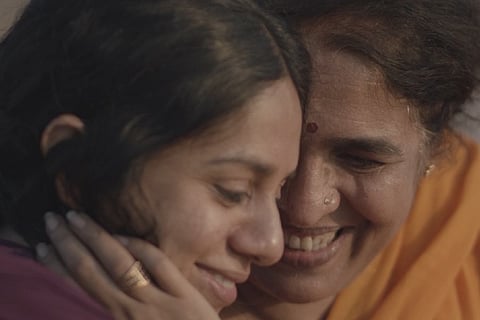

It might have been a casual conversation between two friends, one frustrated by the pressures of her job, the other pacifying her. The two women contrast each other, in age, in their religious markings – a burqa on one, a bindi on the other. It’s only when the tone of the older woman – a vegetable vendor on a street in Mumbai – turns slightly conspiratorial that you notice the softening expressions and their hands touching. Arun Fulara, a Mumbai-based filmmaker, tells a simple and pleasant love story in less than 15 minutes with his work My Mother’s Girlfriend (Mazhya Aaichi Girlfriend). The short film is part of the competition section at the International Documentary and Short Film Festival of Kerala (IDSFFK).
“While working on my previous film Sunday, which explored LGBTQI+ themes, I was exposed to nuanced debates in the community. I met a lot of people in the community and had conversations with them. What I put in My Mother’s Girlfriend is a subplot from a feature film I am making. But the subplot is no longer in the feature. It is about a son’s point of view about his mother who has been in a relationship with someone else,” Arun says.
The son in the film appears midway, just as you watch the two women having a fun day at the beach. By then you are already marveling over the choice of the two characters. It is not your stereotypical young couple. The older woman is in a cotton sari, her grey hair tied to a knot, and in every other way the image of a traditional Indian woman. But the typicality disappears the moment you watch her myriad expressions. She laughs freely, is easily the more adventurous and fun person of the two. The younger one is the more serious one, rebuking her lover for having too many sweets and ignoring her health.
“Love can happen between any two people. These are characters I have seen around me growing up in Mumbai. If you are a vegetable vendor on the street, you have got to be brash, you have got to be a confident woman. And she is unabashed, not seeking approval, not trying to hide anything. Even when I was making my film Sunday I didn’t want it to be preachy. I didn’t want to use my films as a mirror to society but as a hopeful picture of what can be, instead of what is. The onus on accepting reality is not on the members of the community but the rest of the world. Here, it is for the son to come to terms with reality, not the other way,” Arun says.
He has set the story in a working-class background, and the son drives a taxi. His reaction, when he finds out the truth about his mother, is predictable only up to a point. There is shock, there is a strong reaction, but the love he has for his mother comes before anything else. Arun says that he thought of how he would react if it happened to him. The taxi driver is written as a regular guy stuck in his own conditioning but not a violent one. The film does not end dramatically but with a lightness that makes you think it could all be so easy if one just tried.